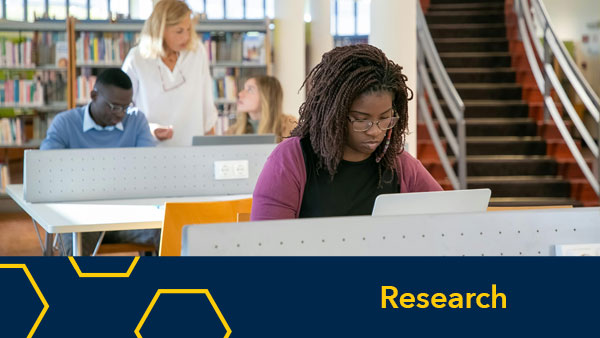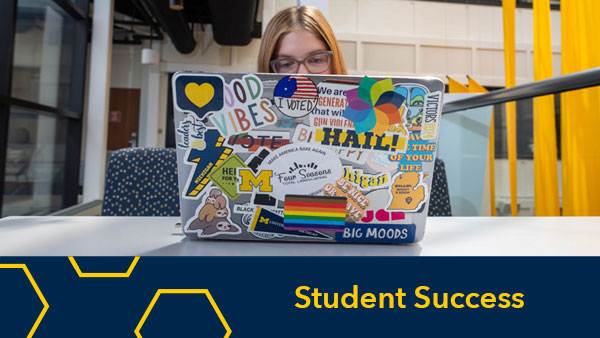Deirdre Lee, Communications Writing Fellow
I never imagined myself holding a fellowship position.
Usually, I’ve heard of professors or professionals holding fellowship titles, not students. When I learned about an opening for the Communications Writing Fellowship at the Center for Academic Innovation, I immediately applied for the position, even though I didn’t know the difference between a fellowship and an internship at the time.
I started my fellowship after returning from the New England Literature Program offered by the English department in the middle of June 2019. Part of the program included separation from technology, so upon starting my fellowship, I plunged back into the life I had left behind for six weeks — frequently using my laptop, headphones, and phone.
For the first several days as a fellow, I became an excited, nervous sponge trying to absorb all of the information the Marketing and Communications team relayed to me, while simultaneously reintroducing myself to technology.
Needless to say, it all was an initial shock.
However, with the encouragement of the MarCom team, I quickly found my groove. Since interviewing is integral to my role, I found myself collaborating with the different Academic Innovation teams, which was a good avenue for me to acquaint myself with students and staff at the center. Fortunately, I’ve always been met with warm smiles.
This friendliness and support bolstered my confidence in my abilities as the Communications Writing Fellow, as I had initial worries about how I’d fit into the role and workspace.
With this comfort and sense of belonging, I looked forward to the world I entered on the eighth floor of Hatcher Graduate Library — blog posts, Twitter, Google docs, interviews, and meetings.
Without having academic courses or student organizations during the summer months of my initial fellowship, I was able to devote more time to my work without having to think about scheduling conflicts or other commitments. This is something I now realize was very beneficial since I had familiarized myself with team members, other fellows, and my own duties during my first few months in this role.
Fast forward to the start of fall term, I added four classes and two student organizations to my plate, while maintaining the fellowship. Initially, I had slight trepidation about effectively managing all of these responsibilities. After meeting with the MarCom team and laying out my commitments, however, we coordinated my fellowship schedule to fit well with my other obligations.
Aside from scheduling, I found the most meaningful part of my fellowship to be the weekly check-ins with the MarCom team. During this time, I’ve been able to freely voice comments, thoughts, and concerns, but more importantly, I have been able to tailor my fellowship experience to my interests.
For me, this meant adapting my Communications Writing Fellowship to revolve around journalism, public relations, and — to a lesser extent — social media, and the MarCom team readily modified my duties to support my interests.
In this process, I’ve learned aspects about these writing styles that haven’t been taught in any residential course I’ve taken thus far. From determining how to frame tweets, structuring a blog post in an inverted pyramid style, to differentiating the purpose of a press release versus a blog post or journalism article, I’ve discovered the experiential learning style the center provides has been the most beneficial way for me to understand the how, what, and why of my tasks.
In a way, my fellowship has allowed me to learn more because of this process.
By making mistakes, I’ve quickly learned the value of productive failure and its role in my work. I’m no expert in what I’m doing as a fellow, but with the center encouraging me to use my mistakes as learning opportunities, I’ve learned more about best practices for my projects.
This has helped to build my confidence in my own abilities, which has allowed me to participate in new opportunities I wouldn’t have felt comfortable doing otherwise. Live-tweets, event coverage, and feature writing are several highlights I’ve enjoyed pushing myself to accomplish.
From these learning experiences, I’ve created an arsenal of unique skills I carry with me, both within and outside of the center. My approach to work has shifted to always promote collaboration and communication, and I never leave home without my laptop, headphones, phone, and their respective chargers.
This fellowship has laid the foundational groundwork for the next steps in my career, whatever it may be, and I know I’m more than capable of taking the next step in my professional writing career.
Read more about our student fellowship program and see what opportunities are available for students on our Student Programs page.


